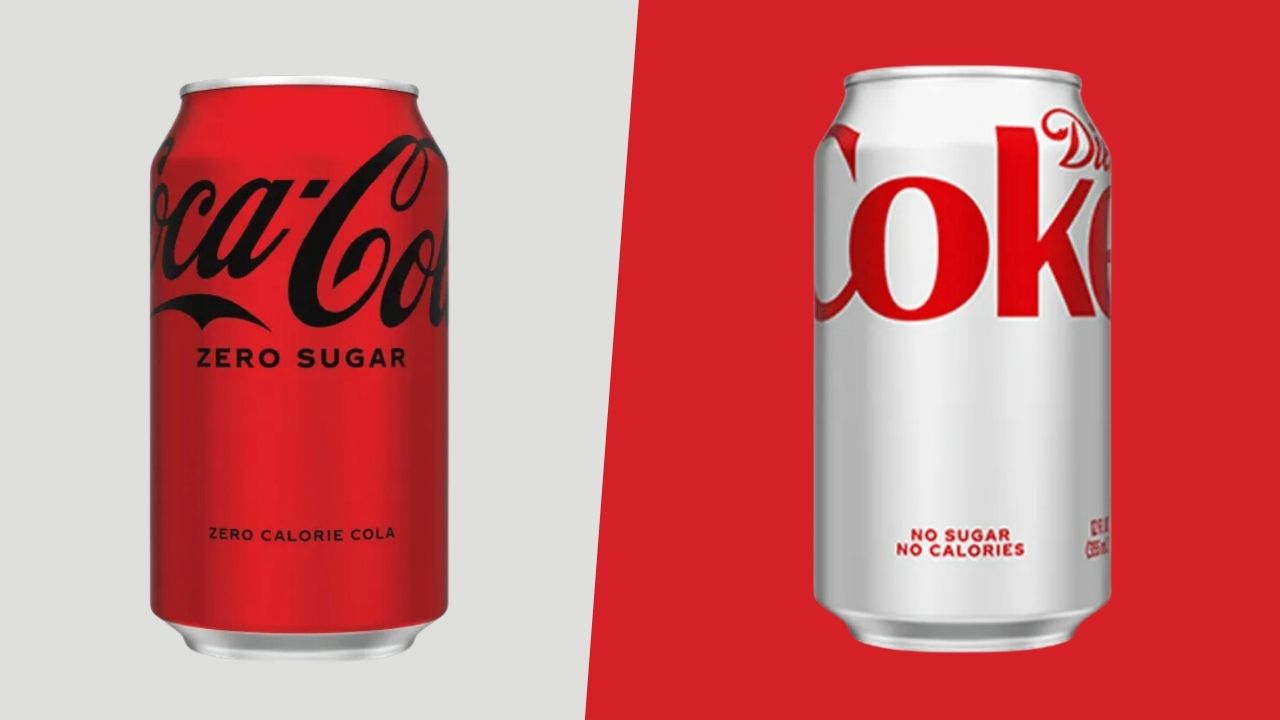Internet Asks: "Difference Between Diet Coke and Coke Zero"
If you’re a fan of zero-calorie sodas but unsure about the differences between Diet Coke and Coke Zero, you're not alone. These two popular beverages might seem similar at first glance, but they have distinct differences when it comes to taste, ingredients, and formulation. Whether you're cutting sugar or looking for a guilt-free soda alternative, understanding the difference between these two options can help you make an informed choice.
sponsored links

Quick Comparison of Diet Coke vs. Coke Zero
| Feature | Diet Coke | Coke Zero |
|---|---|---|
| Taste | Lighter, more citrus-like flavor | Similar to classic Coca-Cola flavor |
| Sweeteners | Aspartame | Blend of aspartame & acesulfame K |
| Calories | 0 calories | 0 calories |
| Caffeine Content | 46 mg per 12 oz can | 34 mg per 12 oz can |
| Packaging | Silver can with red accents | Black can with red accents |
| Launched | 1982 | 2005 |
| Target Audience | Primarily marketed to women | Broader, gender-neutral audience |
| Branding Focus | Sophisticated, lighter option | Closer to Coca-Cola taste |
1. Ingredients and Formula
The primary difference between Diet Coke and Coke Zero lies in their formulation. While both beverages are marketed as sugar-free and contain artificial sweeteners, they have different combinations of these sweeteners.
Diet Coke:
- Sweeteners: Aspartame.
- Flavors: Diet Coke was designed to have a distinct flavor that differs from the original Coca-Cola. It’s slightly lighter and crisper in taste.
Coke Zero (Now Known as Coke Zero Sugar):
- Sweeteners: Aspartame and Acesulfame Potassium (Ace-K).
- Flavors: Coke Zero was formulated to taste as close to regular Coca-Cola as possible, offering a near-identical flavor without the sugar.
2. Taste and Flavor Profile
One of the key factors that differentiates these two beverages is the taste:
Diet Coke:
Unique Flavor: Diet Coke has a flavor that’s somewhat citrusy and different from regular Coca-Cola. This was intentionally done to set it apart as its own product, rather than a direct replica of classic Coke.
Coke Zero:
Similar to Classic Coca-Cola: Coke Zero’s formulation aims to mirror the taste of regular Coca-Cola, making it an appealing option for those who want the classic Coke flavor but without the sugar or calories.
3. Nutritional Facts and Caffeine Content
Both Diet Coke and Coke Zero are zero-calorie beverages, but they vary slightly in caffeine content:
| Nutrient | Diet Coke | Coke Zero |
|---|---|---|
| Calories | 0 | 0 |
| Sugar | 0g | 0g |
| Caffeine | 46 mg per 12 oz can | 34 mg per 12 oz can |
If you’re sensitive to caffeine or trying to reduce your caffeine intake, this difference might influence your decision.
4. Branding and Audience
Both Diet Coke and Coke Zero have carved out distinct places in the marketplace:
Diet Coke:
Originally introduced in 1982, Diet Coke has been a favorite among people who prefer a lighter, crisper soda. It’s often associated with the diet-conscious consumer and has a large following.
Coke Zero:
Launched in 2005, Coke Zero was designed to capture the attention of people who wanted the taste of regular Coca-Cola without the sugar. In 2017, it was rebranded as Coke Zero Sugar, with a new formula that closely mimics the original Coca-Cola taste.
5. Packaging and Visual Differences
The cans are easily distinguishable by their color schemes:
- Diet Coke typically comes in a silver can with red accents.
- Coke Zero features a black can with red accents, resembling the classic Coca-Cola branding.
sponsored links
Which is Healthier: Diet Coke or Coke Zero?
Both Diet Coke and Coke Zero offer zero calories and zero sugar, making them healthier options compared to sugary sodas. However, the healthiness of these drinks largely depends on your preference for artificial sweeteners and how your body reacts to them.
- Diet Coke is sweetened solely with aspartame, while Coke Zero uses a blend of aspartame and Ace-K.
- While some studies have raised concerns about the long-term effects of artificial sweeteners, they are considered safe by the U.S. Food and Drug Administration (FDA) in moderate amounts.
Conclusion: Which One Should You Choose?
When deciding between Diet Coke and Coke Zero, it all boils down to personal preference and your priorities:
- If you prefer a unique, lighter soda flavor, Diet Coke might be your go-to option.
- If you want the taste of classic Coca-Cola but without the sugar, Coke Zero is likely the better choice.
In terms of health, both beverages are calorie-free but contain artificial sweeteners that some may choose to avoid. It’s important to consume any type of soda, even sugar-free options, in moderation.
Disclaimer: This article is for informational purposes only and should not be taken as medical or dietary advice. Always consult a healthcare professional before making any significant changes to your diet or if you have concerns about consuming artificial sweeteners.
References
1. Diet Coke - Refreshing taste with no calories | Coca-Cola US. (n.d.). https://www.coca-cola.com/us/en/brands/diet-coke
2. Coca-Cola Zero Sugar - All products & Ingredients | Coca-Cola US. (n.d.). https://www.coca-cola.com/us/en/brands/coca-cola/products/zero
3. Program, H. F. (2024, September 25). Aspartame and other sweeteners in food. U.S. Food And Drug Administration. https://www.fda.gov/food/food-additives-petitions/aspartame-and-other-sweeteners-food
People are also reading...
Veggie Meal Prep?
Does Celsius Have Caffeine?
Matcha Green Tea Latte Starbucks Calories
See the answer to: "Matcha Green Tea Latte Starbucks Calories"
Dave's Hot Chicken Calories
Highest Protein Taco Bell
Low-Carb Taco Bell Options
Is Core Power Good for You?
Best OMAD Meal
Vegan Low Carb Meal Plan
Ready to level-up?
Create meal plans 10x faster, follow up with your clients through our mobile app, and never struggle with meal planning or recipe management again.